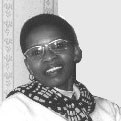PUMLA
GOBODO-MADIKIZELA

Growing up in the township of Langa near Cape Town, Pumla, like many of her contemporaries in the late 60s and early 70s, became politically aware at an early age. It was only when she had completed her university studies, however, that she found the opportunity to combine her emotional energy with the skills she had learned from her studies.
Having
qualified as a Social Worker, Pumla went on to take an honours degree
in Psychology. On completion of her studies she took a position in the
rural area of the Maluti region where she raised funds to increase awareness
of the plight of the physically challenged in the area. These funds
provided much needed relief to families whose disability grants had been
withdrawn by the government.
Pumla became aware of the problems of psychiatric patients at the nearby
hospital -- many of whom were being released only to relapse and be readmitted.
This
prompted her to study for a masters degree in Clinical Psychology at Rhodes
University. During her studies and in subsequent work practice, Pumla
realised that misdiagnosis was often the cause of the problems she had
originally noted in the Maluti region.
As a result she designed and introduced culturally sensitive assessment
methods for the diagnosis and treatment of black patients.
Her
expertise in this area of study led to her being asked to address conferences
and publish articles on the importance of recognizing cultural backgrounds
in assessment and the neglect of primary mental health care in communities.
For
eight years, Pumla lectured at the University of the Transkei and initiated
a number of community initiatives along with women who shared the
same concerns about community mental health.
Outside
of her academic duties, Pumla started a book forum for children
in Umtata, established a preschool centre
in a squatter community and initiated the first Children's Rights Forum in
the Eastern Cape.
Due to her involvement with the latter, Pumla went on to become
the National Coordinator of a UNICEF project and was invited to
speak at the United Nations
in New York on the issue of rural children in South Africa.
As a member of the TRC's Human Rights Violations Committee, Pumla designed the first outreach program, conducted public talks on the role of the TRC, coordinated the hearings process in the Western Cape and headed a project on perpetrators of atrocities.
She also mediated between victims and perpetrators and wrote several articles for local and international newspapers on the role that the TRC would play in healing the nation. Her experiences at the TRC led to three published works and numerous awards for her studies, research and contributions to the betterment of society.